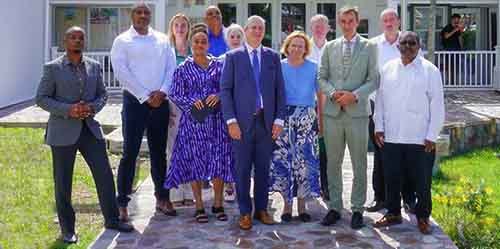WolBES and FinBES amendments
State Secretary van Marum’s first meeting on Saba was a joint session with the Executive Council and Island Council members, where they discussed the proposed amendments to the WolBES and FinBES legislation. The meeting served as an open dialogue, with council members voicing concerns, particularly regarding the decision to retain the position of the rijksvertegenwoordiger (Kingdom Representative). Council members referenced prior discussions held in 2024 in De Bilt and emphasized the need for a shift in how the position is approached, granted the local context and culture. The importance of monitoring and evaluation of the role was also mentioned.
State Secretary van Marum acknowledged the value in striking a fair balance and affirmed that input from the islands is crucial when it comes to the Kingdom Representative position. Furthermore, he recognized that each island in the Caribbean had its own unique dynamics and needs that must be taken into account, and the stark differences when compared to the European Netherlands.
The consultation period for the proposed amendments remains open until October 27th. A follow-up discussion is expected to take place afterward, based on the results of the consultation.
Site visits
A site visit was then made to the Black Rocks Harbor construction zone, where Commissioner Bruce Zagers and Department Head of Infrastructure and Spatial Planning, Zelda Meeuwsen, provided a brief update on the ongoing progress at the location. This included preparations of the campsite for the workers who will arrive in the upcoming months, and the timeline of the project, which is dependent on the hurricane season. The coral relocation project was also highlighted, whereby critically endangered coral have been removed from the site and moved to another suitable location nearby, with a high survival rate.
Following this, the delegation went to the Waste Facility, where they met Supervisor Patrick Hassell, who gave an explanation on how the waste is sorted for recycling, and then shipped off the island. Head of Department Roxanne Simmons also shared an update on the metal baling project/car wreck removal program, which gave way for numerous derelict cars to be baled. They also discussed steps PES is taking to investigate various regional and innovative solutions for sustainable waste management.
The next stop was a combined visit to the Saba Conservation Foundation (SCF) and the Saba Research Center. SCF director, Kai Wulf, gave an overview of Saba’s protected marine and terrestrial areas and discussed SCF’s role in various conservation projects, including their involvement in relocation of coral from the Black Rocks Harbor site, collaboration on the invasive species control projects led by Public Entity Saba, and their key role in maintenance of the trails and national park. Wulf also emphasized the importance of Saba’s biodiversity locally and relative to the European Netherlands.
At the Saba Research Center, Luc Roozendaal, a researcher from Van Hall Larenstein, presented aspects of the ongoing Reef Grazers project, which focuses on the restoration of reef ecosystems via the cultivation of native invertebrate species, while also pursuing the potential for the diversification of local fisheries. A major part of the research involves monitoring interactions between key species like sea urchins, Caribbean king crabs, and whelks. These efforts closely align with the goals of the Nature and Environment Policy Plan, which emphasizes the preservation of natural ecosystems and supports long-term food security.
Another key infrastructure project visited was the site of the upcoming development in St. John’s, which forms part of a broader masterplan for the area. Central to this masterplan is the construction of an Enrichment Center, the new school gym, and the technical school, funded through the Regiodeal in collaboration with the Ministries of VWS and OCW, and PES. According to Department Head of Community Development Rosa Johnson and Project Manager Carine Ghazzi, the Enrichment Center is envisioned as a hub for both students and the wider community, which will provide opportunities for development and engagement across the fields of education and culture, serving as a vital point of connection and supporting a more inclusive approach to community-building on the island.
In alignment with the outline of the NEPP on food security, the delegation also viewed the work being done at the Hydroponics Farm. Lead Farmer Sam Frederick led the tour, showcasing the innovative systems in place, ranging from nutrient film technique (NFT) units and bucket systems to custom-built vertical tower systems. Frederick also explained how the systems are designed with resilience in mind, including the ability to be moved indoors during hurricanes using detachable wheels. The farm currently grows a variety of produce, including lettuce, cucumbers, peppers, and eggplants. State Secretary van Marum also visited other sites, including the tree nursery, the butcher station, and the Saba Reach Garden in The Level.
All of these initiatives reflect the island’s broader commitment to sustainable food production and resilient future-proof structures, which provide a solid long-term vision for Saba.
“I thank Saba for the pleasant visit and the good and constructive conversations I had with the Executive Council and the cooperative Island Council,” said van Marum. “I was very impressed by all the projects like the harbour, the waste facility, the agricultural projects and the enrichment center, and all the achievements that have been reached. It’s encouraging to see that cooperation pays off for the well-being of the residents.”
PES

 Saba News News and Information from Saba Island, Dutch Caribbean
Saba News News and Information from Saba Island, Dutch Caribbean

